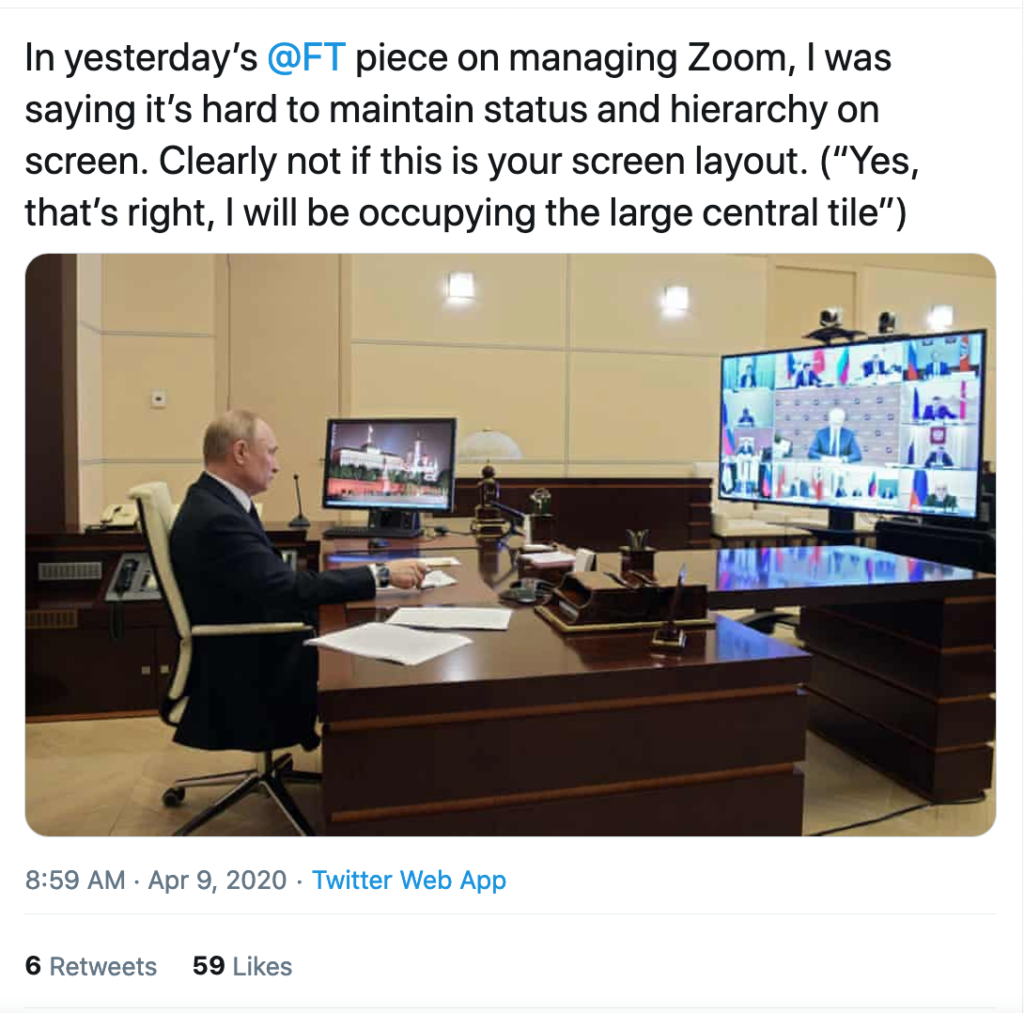Family life
Seen on a walk the other evening. Click on the image for a bigger version. And note how the Dad is standing on one leg.
Why Cory Doctorow isn’t writing about Trump and Twitter and Section 230
Basically, because life is too short.
People have asked me why I haven’t written about Trump’s executive order on social media and CDA 230. Here’s why.
As everyone who understands the law knows, this will not survive contact with the judiciary. It’s unconstitutional and incoherent and just stupid.
It’s as if Trump declared up to be down, and then threatened FAA sanctions against anyone caught standing on the ground. This will doubtless inflict pain and chaos, but the first judge that hears the case will tell him to knock it off and stop being an idiot.
The real purpose – tissue thin, totally obvious – is to get us to stop paying attention to white nationalism, pandemic genocide, 101,000 dead, and corruption and start talking about whether up is down.
And life is short.
I agree.
But in case you need the chapter and verse, the EFF has a good explainer
So is the central office and the daily commute really a thing of the past?
There’s a lot of confident clap-trap being talked at the moment about “the death of the office” and how the future is remote working from home. It’s the inevitable outbreak of first-order thinking. I’m sore some things will change, but the idea that a system that’s been entrenched for a century is going to change overnight is unrealistic.
The New Yorker has just published the most thoughtful piece on this that I’ve read to date. It’s by Cal Newport, a computer scientist.
At some point, the pandemic and its aftershocks will fade. It will once again be safe to ride commuter trains to office buildings. What then? Many companies seem amenable to the idea of lasting changes. In April, a survey of chief financial officers conducted by the research firm Gartner found that three-quarters planned to increase the number of employees working remotely on a permanent basis. From an economic perspective, companies have a lot to gain from remote work: office space is expensive, and talent is likely to be cheaper outside of the biggest cities. Many workers will welcome these changes: in a recent Gallup poll, nearly sixty per cent of respondents said that they would like to keep working remotely after restrictions on businesses and schools have been lifted. For them, the long-promised benefits of work-from-home—a flexible, commute-free life, with more family and leisure time—have finally arrived.
There are also social reasons to cheer a more remote future. It might help reverse the geographic stratification of American life. Workers, and their spending, could break out of the unaffordable metropolises and spark mini-revitalizations off the beaten path, from Bozeman to Santa Fe. Remote work could be good for the environment, since less commuting means fewer emissions. (Although the recent movement of Americans out of sprawling suburbs and back into dense cities was, in itself, an environmental good.)
And yet…
remote work is complex, and is no cure-all. Some of the issues that have plagued it for decades are unlikely to be resolved, no matter how many innovations we introduce: there’s probably no way for workplaces to Zoom themselves to the same levels of closeness and cohesion generated in a shared office; mentorship, decision-making, and leadership may simply be harder from a distance. There is also something dystopian about a future in which white-collar workers luxuriate in isolation while everyone else commutes to the crowded places. For others, meanwhile, isolation is the opposite of luxury. There may be many people who will always prefer to work from work.
Long read, but well worth it.
Dominic Cummings: the farce continues
Very nicely skewered by Henry Mance in the weekend edition of the FT entitled “The Nostradamus of North London has Done It Again”. Sample:
The most amazing part of the Cummings saga is not his attempt to bankrupt opticians and car insurers with a new system of on-road eye tests. No, it is his attempt to mislead us all about his handling of coronavirus.
At Monday’s press conference, Mr Cummings played the Nostradamus of north London: “Only last year I wrote explicitly about the danger of coronaviruses.” Turns out it was a bit more complicated than that. Instead, last month, on Mr Cummings’ first day back at work after his Durham trip, one of his blogs from March 2019 was edited to add an express reference to coronavirus. History will be kind to Mr Cummings, for he intends to rewrite it.
I don’t like calling politicians liars, because it’s hard to know what’s going on inside their heads. You’re only lying if you say something you know to be untrue. Yet Mr Cummings has a track record in calculated misleading statements, such as, “We send the EU £350m a week” and, “Turkey (population 76m) Is Joining the EU”. I don’t want to call him a liar. But I also can’t say that he isn’t a liar. Because then I would be a liar.
I suppose Mr Cummings sees the truth as a civilian casualty in his offensive against the establishment. A non-exhaustive list of his targets includes: teaching unions, the civil service, anti-Brexit MPs, pro-Brexit MPs, the UK Statistics Authority, the CBI, the BBC, ITV, Channel 4, a number of print publications, except the one his wife works for. Perhaps everybody else in Britain has to change so that Mr Cummings can stay the same, but it does seem like changing a lightbulb by screwing the whole world. There may be an easier solution.
Lovely. There’s a lot of mileage still in the Cummings story, before it reaches its foregone conclusion.
Quarantine Diary — Day 70
This blog is also available as a daily email. If you think this might suit you better, why not subscribe? One email a day, delivered to your inbox at 7am UK time. It’s free, and there’s a one-click unsubscribe if your decide that your inbox is full enough already!



